In this article:
Infused or flavored water has become very popular in recent years. According to a market research study, many people identified infused water to be the fourth most popular beverage, after plain water, tea, and coffee. (1)
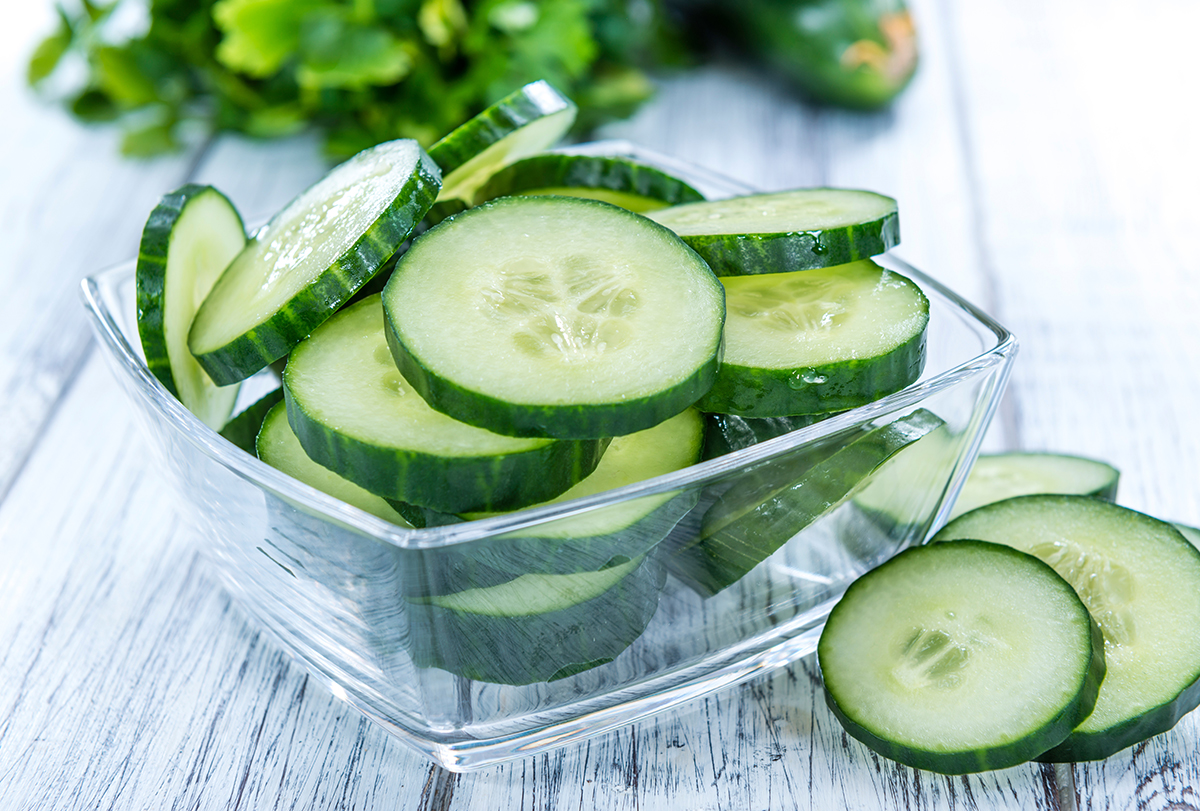
Flavored water adds to the palatability of drinking water, making it easy to drink for those who find it difficult to meet the required amount of water in a day.
According to market research, people rated their choice of flavored water based on the following qualities: (1)
- Refreshing
- Thirst quenching
- Micronutrient (vitamin and mineral) content
In addition, people preferred a sweeter taste over sour and bitter tastes.
This article presents a list of ingredients you can add to your water to make it more delicious.
Ingredients That Can Make Water Taste Delicious
Add these ingredients to enrich your water drinking experience.
1. Cucumber
Cucumber is a water-rich food that has a very refreshing taste. It is abundant in water-soluble nutrients and electrolytes (2) that increase the nutritional content of water while making it more hydrating and beneficial.
Cucumber has some antidiabetic and antioxidant activities and can also prevent the accumulation of fat in the body. Its seeds have a cooling effect on the body, though they need to be ingested for this function. (2)
For these reasons, cucumber is the most popularly used ingredient for flavored water.
2. Mint
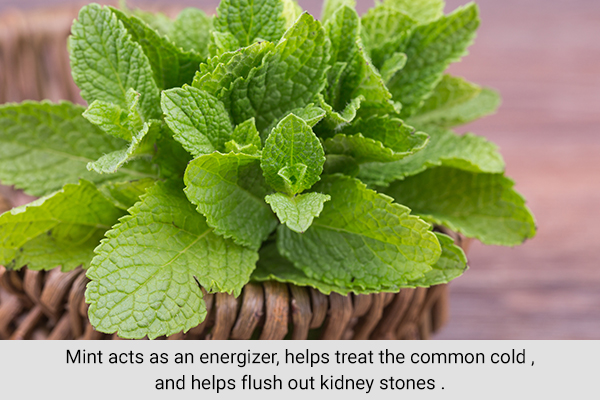
Mint is another popular choice to add to drinking water. It has been proclaimed to have many health-benefiting properties according to folk medicine. A tea made from mint is consumed for stomach distress.
If mint is left to steep in drinking water for a few hours, its water-soluble compounds dissolve in water, which can be useful to ease stomach pain, benefit the nervous system, and fight microbes. (3)
Mint also acts as an energizer, provides relief from common cold, and can reduce kidney stones. (3)
3. Ginger
Ginger’s main use is its ability to reduce nausea and vomiting, especially in pregnant women. It can also soothe digestive issues, reduce cramping, and curb inflammation. (4)
4. Citrus fruits
Citrus fruits such as oranges, lemons, and limes are popular fruit choices for infused and flavored water. They are known for their abundant vitamin C, which is a water-soluble vitamin.
Infusing water with citrus fruits allows it to become a powerhouse of vitamin C, which helps boost energy and lowers fat in the body.
Some of lemon’s antioxidant polyphenols are also water soluble. (5) Ginger and lemon infusions are also known to boost immunity and can have some anticancer effects. (6)
5. Berries
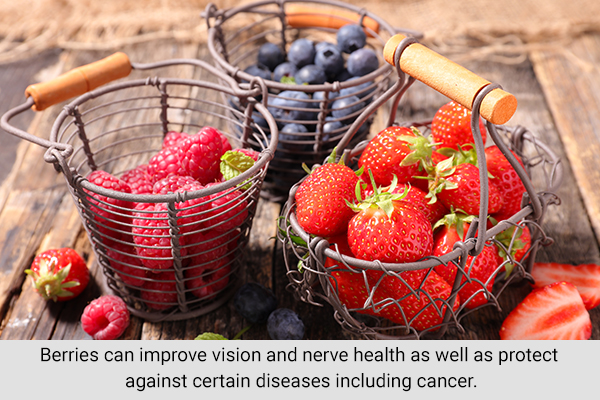
Strawberries, blueberries, and raspberries are also preferred fruit choices for drinking water.
Their main bioactive compound – anthocyanin – is water soluble and provides antioxidant and antimicrobial properties. It improves vision and nerve health as well as protects against certain diseases including cancer. (7)
6. Peaches
Peaches have a sweet and tangy flavor that is a favorite of many people. But it is also replete with many water-soluble nutrients including polyphenols, antioxidants, and flavonoids. (8)
Peach-infused water can be beneficial for boosting energy, improving age-related diseases, and preventing cancer. (9)
7. Melons
Certain melons such as cantaloupe and watermelon can make delicious infused water.
Cantaloupe has beneficial polyphenols that act as antioxidants and protects the body against age-related degeneration, heart diseases, and even cancer. (10)
Watermelon is rich in minerals and can add a very refreshing taste to water. Its water-soluble components can protect against heart diseases, diabetes, degeneration of the eyes, and even cancer. (11)
You can also eat the added fruit pieces to gain more health benefits, especially of lycopene, which is not soluble in water.
8. Fennel seeds
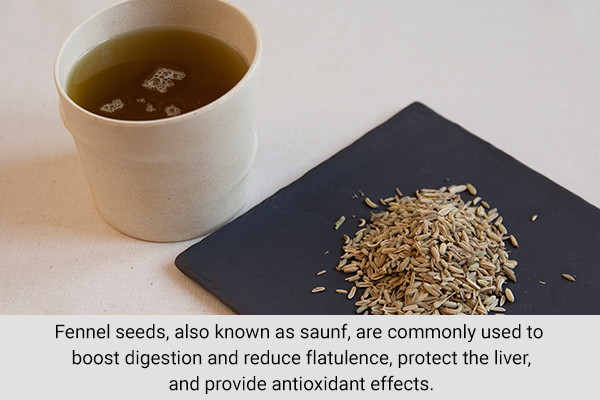
Fennel seeds, also known as saunf, are commonly used to boost digestion and reduce flatulence, protect the liver, and provide antioxidant effects.
Fennel tea is properly prepared by boiling fennel seeds in water for a few minutes. Leaving the seeds overnight in water is likely to have a similar effect. (12)
9. Rosemary
Rosemary is a popular herb used in many cuisines. Traditional medicine uses rosemary to treat spasms and cramps, numb pain, reduce migraine, treat sleeplessness, and boost mood. It has many health benefits but can add a strong taste to water. (13)
Inhaling rosemary’s smell is also known to reduce stress and anxiety and improve memory. (13) These benefits can be exploited by inhaling the scent of rosemary-infused water.
10. Cinnamon
Cinnamon is a very useful spice that has a slightly sweet taste. It is popularly known to treat and manage diseases such as diabetes and arthritis. It also prevents the accumulation of fat in the blood vessels because it has anti-inflammatory, antimicrobial, and even anticancer activities. (14)
How to Make Infused Water
First, choose any of the ingredients listed above or combine them according to your taste preference. Some preferred combinations are cucumber-mint, lemon-mint, lemon-ginger, berries-lemon, cinnamon-peach, and watermelon-mint.
Then, add 1 cup of chopped ingredients to 1 liter of water and allow to infuse for 6–7 hours or even overnight. Avoid adding any sweetener, and drink the water-infused water chilled.
Precautions to Consider
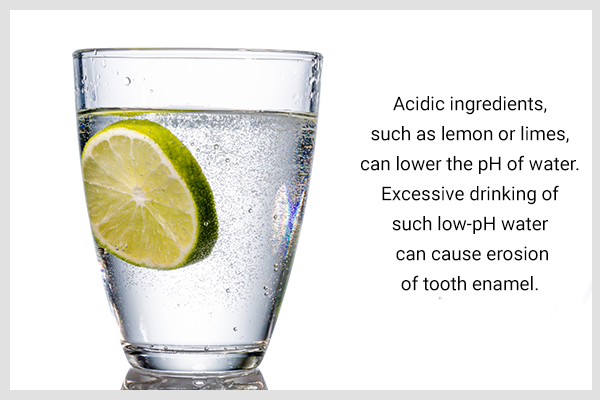
Here are some precautions you need to keep in mind before consuming flavored water:
- Avoid using ingredients you are allergic to.
- Consume the infused water within a day before it starts to spoil.
- Acidic ingredients, such as lemon or limes, can lower the pH of water. Excessive drinking of such low-pH water can cause erosion of tooth enamel. (15)
Most-Asked Questions
What time of day should I drink infused water?
Infused water can be had any time of the day just like plain water. If you use digestion-boosting ingredients such as fennel, ginger, and lemon, you can also drink a cup of infused water 30 minutes after meals.
What is the best ingredient to add to infused water?
What you add to infused water will depend on your taste preference, but the foods mentioned in this article are specifically chosen for their health benefits and due to their content of water-soluble components.
Final Word
Infused water is very popular and can motivate people to drink more water, especially children. The addition of nutrient-rich ingredients will not only make the water taste better but also boost its nutritional value.
Choose ingredients based on your taste preference, but do not leave infused-water for too long before consumption.
- Was this article helpful?
- YES, THANKS!NOT REALLY


